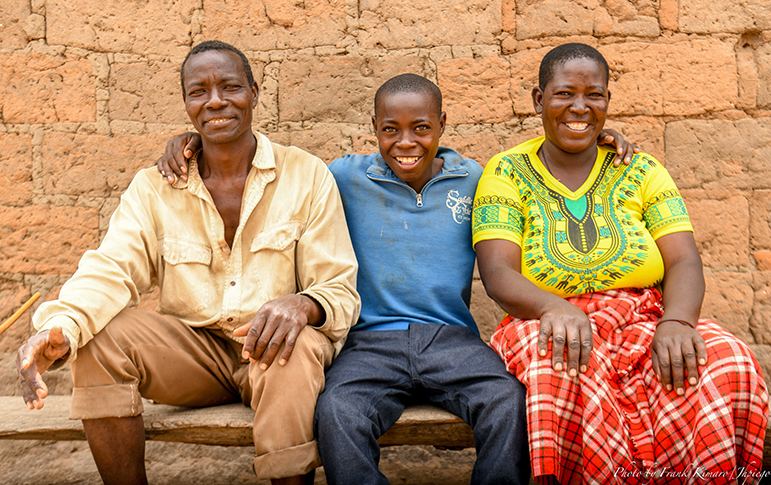
Singida Region, Tanzania—Jilala Shusha’s personal milestone says a lot about his country’s commitment to delivering on the promise of an AIDS-free generation. At 17, Jilala decided to be circumcised, even though traditional circumcision is not practiced by his family, who are migrant herders of goats and cattle.
With support and informed consent from his family, the teenager walked to the Ng’ongosoro Dispensary one day last November, where he was counseled and underwent the minor surgery. “I am happy,” Jilala says, recalling his experience. “I feel fresh.” His response reflects the impact of the government’s delivery of a comprehensive package of high-quality, respectful HIV prevention and treatment services to Tanzanian men and youth, wherever they live.
Jilala was the 1 millionth client to be circumcised since Jhpiego started supporting voluntary medical male circumcision (VMMC) services for HIV prevention in Tanzania in October 2009 with funding from the US President’s Emergency Plan for AIDS Relief (PEPFAR) through the US Agency for International Development (USAID). Utilization of VMMC services has grown steadily as suspicion, myths and cultural misconceptions give way to community acceptance, peer support and hope for an HIV-free future. “It was challenging when we introduced VMMC services in communities that did not practice circumcision,” says Alice Christensen, Strengthening High Impact Interventions for an AIDS-free Generation’s chief of party, who is also a nurse. “It took a patient, inclusive approach at various community levels to gradually have communities become accepting of circumcision for HIV prevention. We used a variety of communication channels, including engagement with community gatekeepers and local leaders, to win over influencers and potential VMMC clients, eventually shifting the cultural norms to accept circumcision.”

Jilala, one of 25 children in a polygamous family, lives with his parents in Ng’ongosoro Village, Issuna Ward of Singida Region. While many communities native to this region traditionally circumcise, Jilala’s family is part of a migrant community of pastoralists that does not. When out in the fields, boys bathe collectively in the rivers. As Jilala’s friends came to know that he was not circumcised, they started to tease him. Jilala did not know how to address his discomfort with his parents. As his father says: “We did not know about the health benefits of doing it. We just knew it was not our culture.”
In Tanzania, VMMC services are prioritized for adolescent boys and men aged 10–29. Clients below the age of 18 need to be accompanied by a parent or guardian to provide written consent. Jhpiego implemented a VMMC campaign in Singida Region from November 12–December 7, 2019, to expand access in rural and remote areas where health facilities do not yet provide VMMC services. During campaigns, local volunteer community advocates (VCAs) educate and refer clients, arrange clinic visits, and support follow-up after the procedure. A VCA from Ng’ongosoro Ward persuaded one of Jilala’s elder brothers to use VMMC services. Jilala’s brother convinced him to get circumcised as well. ”Jilala came to me and told me about it,” says his mother. “I told him, ‘If it is what you really want, then you may do it.’”
Jhpiego has supported the National AIDS Control Program and the regional administration and local governments in Iringa, Morogoro, Njombe, Singida and Tabora regions. The five regions introduced and scaled up the national VMMC program through three USAID-funded projects: the Maternal and Child Health Integrated Program, Accelovate, and the Strengthening High Impact Interventions for an AIDS-free Generation Project, led by JSI Research & Training Institute with seven partners, which ended in December 2019.
Jhpiego via USAID support started at one health facility with 10 trained providers in Iringa Municipal Council, increasing over 10 years to 75 health facilities served by 750 active trained providers in five regions. Engagement with communities has grown exponentially, from one council at inception to activity in all 35 councils of Iringa, Morogoro, Njombe, Singida and Tabora regions today, from having no dedicated promoters to deploying more than 1,000 VCAs who were born, live and work in the communities they serve. Jhpiego is responsible for one-third of all VMMCs performed in Tanzania since the national VMMC program launched in 2009. It has helped to increase the national VMMC prevalence from 66% to 80% between 2007 and 2016, according to Tanzania HIV indicator surveys.
The 2016 HIV indicator survey reported that every year, 16 out of every 10,000 men 15 and older are newly infected with HIV in Tanzania. The national HIV prevalence is 4.7%, rising to as high as 11.3% and 11.4% in Iringa and Njombe regions, respectively, where Jhpiego has implemented VMMC activities. Jilala’s age group constitutes 43% of all VMMC clients served through USAID support. They are a PEPFAR priority population for HIV prevention.

Key to achieving epidemic control because of their heightened HIV risk when they become sexually active, Jilala and his peers are the brave face of an AIDS-free generation in Tanzania: aware, decisive, and undeterred. “I am thankful for this service,” says Jilala. “I will persuade my fellow youth to get circumcised.”



